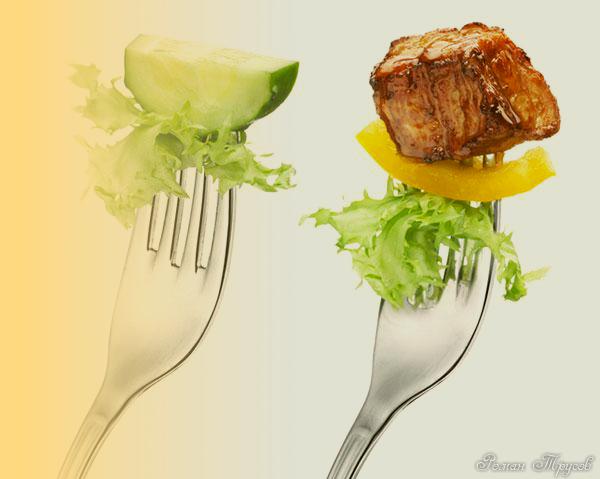Vegetarianism is a power supply system in which a person totally or partially refuses to animal food, preferring it to the plant. Vegetarian food can be divided into several types: sometimes people refuse only on meat, and sometimes - on milk, eggs and other products somehow derived from animals.
Of course, for many vegetarians main reasons to select such a system, diet and lifestyle is a moral and ethical dimension, aimed at eradicating violence against animals. And yet, very often vegetarians as an argument to use judgment about what to order vegetarian food healthier meat. But is it really? Is the rejection of meat products is able to miraculously improve human health, to solve the problems with the stomach and does not cause harm? Let's deal.
Types of vegetarian food
Before we talk about the dangers of vegetarianism should be familiar with the main types of power systems.
• Vegetarianism classic: excluded from the diet of only meat and fish products. Such systems often do not adhere to ethical reasons, but simply because of dislike for such a meal or individual intolerance.
• Laktovegetarianstvo - this allows you to use the power of honey and milk products, but eggs, meat, animal fat and fish are completely eliminated.
• Ovo-vegetarian - in contrast to previous species, is allowed eggs and honey, and milk and its derivatives are not used.
• Vegan - full transition to vegetarian food and mushrooms.
• Raw food diet - eating plant foods that are not processed thermally.
• fruitarianism - eating only fruit plants.
Harm vegetarianism
In order to refute the harmlessness of a vegetarian diet and to determine what is the harm such systems, use the main reasons and arguments of vegetarians.
Man is not a predator
Indeed, man is a predator, but it can not be called herbivores. That is why a man of understanding is being omnivorous - people are different from herbivores digestive system and the structure of the jaw. If we were herbivores, our stomach was not just to digest the meat.
Vegetarian food balanced
Vegetarians, making a meal plan, compensate for the lack of animal protein with vegetable. Here we see the obvious harm to the body: in the vegetable protein vitamin B12, necessary for the process of hematopoiesis, is completely absent. Deficiency of this vitamin leads to anemia, not only, but also to the severe impairment of mental health.
It should also be noted that the animal protein is better absorbed by the human body. The same applies to iron contained in red meat - the element contained in fruits and vegetables, hardly enters the bloodstream.
Vegetarianism is cheaper than eating meat
It can be put into question by the fact that all vegetarians are perfectly balanced diet. There adherents of this power is used most insane myth that eating meat costs much more.
In fact, a vegetarian diet to fill the necessary proteins, fats, amino acids and vitamins, it is necessary to stock a huge number of legumes, mushrooms, fruits, berries and vegetables. In the summer and autumn, you can still do the gifts of nature and inexpensive seasonal products, all this winter will cost a pretty penny.
From the foregoing it follows the following situation: in an attempt to save vegetarians often limit themselves, eliminating the need to support the work of the body proteins (nuts, mushrooms, chickpeas, beans), passing on cheap vegetables and carbohydrate foods (potatoes, zucchini, bread, pasta). All this causes deficiency in the body of a variety of vitamins, minerals and other nutrients.
Vegetarianism: the harm and consequences
So, we summarize the most pronounced effects of vegetarianism:
• Deficiency of vitamin A, D and B;
• Lack of iron, phosphorus, iodine, potassium, calcium and zinc;
• Low bone density, frequent fractures;
• Deterioration of nails, skin and hair;
• Fatigue during exercise;
• Anemia and disorder of the nervous system.
It is also not strictly recommended to follow such a diet for people suffering from diseases of the gastrointestinal tract (gastritis, ulcers of the stomach and intestines, ulcerative colitis), pancreas, anemia, as well as pregnant women, nursing mothers and children.
